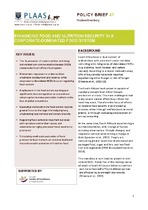| dc.contributor.author | Greenberg, Stephen | |
| dc.date.accessioned | 2019-02-26T13:32:27Z | |
| dc.date.available | 2019-02-26T13:32:27Z | |
| dc.date.issued | 2017 | |
| dc.identifier.citation | Greenberg, S. (2017). Enhancing food and nutrition security in a corporate-dominated food system. Policy Brief 47, Bellville: Institute for Poverty, Land and Agrarian Studies, University of the Western Cape | en_US |
| dc.identifier.uri | http://hdl.handle.net/10566/4301 | |
| dc.description.abstract | South Africa faces a ‘dual burden’ of
malnutrition, with persistent under-nutrition
coinciding with rising rates of diet-related NCDs
(e.g. diabetes, heart disease, and certain
cancers). According to a recent national survey,
54% of households nationally reported
experiencing either hunger or risk of hunger
(Shisana et al., 2013:10).
The South African food system is capable of
supplying enough food either through
production or trade. The main challenge is that
many people cannot afford to purchase the
food they need. Therefore the focus of efforts
to improve food security is on increasing
incomes, either through welfare (such as social
grants), or through increasing employment or
entrepreneurship. | en_US |
| dc.language.iso | en | en_US |
| dc.publisher | Institute for Poverty, Land and Agrarian Studies, University of the Western Cape | en_US |
| dc.relation.ispartofseries | Policy Brief;47 | |
| dc.subject | Food | en_US |
| dc.subject | Nutrition | en_US |
| dc.subject | Corporate-dominated | en_US |
| dc.subject | South Africa | en_US |
| dc.subject | Malnutrition | en_US |
| dc.title | Enhancing food and nutrition security in a corporate-dominated food system | en_US |
| dc.type | Other | en_US |

